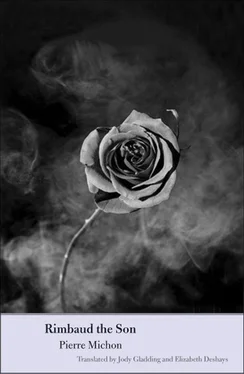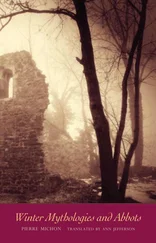Devoutly we want to believe that Banville heard the Te Deum; that perhaps he heard in the schoolboy’s verse a very distant echo of the leap that Carabosse made into the inner closet; her marriage with the Captain renewed there; the perfect nuptials of bugle and paternosters; the ridiculous little domestic drama magnified into a high mass, set forth in clear language, but draped, unrecognizable. Or if you prefer quainter images, borrowed from the catechism of that time, which Banville read, and not from those family histories which are our own meager catechism, the obscure rhyme that he heard was the one that strikes charity and anger against one another, infinite rancor and mercy, holds them in each hand, each of them distinct, intact, irreconcilable, sworn enemies, and releases one against the other like fighting cocks, unleashes them, recaptures them, and punctuates that explosion with a great confrontation of drums. And if your personal devotion offers you other metaphors (which you take for thought and which are thought), you call the two terms of this little tom-tom by different names: you say that it is revolt and pure love, or nothingness and salvation, or the endless fall and within the fall the inexhaustible presence of what is no longer called God; you say that it is in mourning God and in pretending God is restored; and if you do not like God you say that it is the free joy of being alive and the darker joy of being slave to death, whatever: what matters is having the great cymbals well in hand, knowing how to make them clash and that they make that noise one hears in Rimbaud. And lending an ear to that music, Banville, who was not dishonest, who had long ago lost that inner rhyme but knew how to recognize it in others, Banville picked up a pen thoughtfully and prepared to reply; in silk skullcap at his poet’s desk, with the peonies and no doubt some Doric knick-knack close at hand that served as paperweight, pensively stirring the tea with rum that Verlaine tells us one drank at his house, reflecting, weighing the pros and the cons, this man who resembled the Gilles replied. He paid the young man from the Ardennes the courtesy of augury, and sent by post the little cutting in letters that are no longer in our possession.
Perhaps I am wasting my time with Banville. I am wasting my time with this poor old man who yesterday came from Moulins with all the poetry of the earth in his heart and who is being destroyed in Paris by schemes, success, power and the approach of death; Banville, whose only function is to be interim leading poet — because Hugo on his island is unavailable, bent over he listens to the beat of Shakespeare’s foot in the four feet of his table — that is to say, to deliver the little cutting to the greenhorns of Douai or Charleville; Banville who is nothing, hardly the shadow that returning down rue de Rome lifts his head toward the pigeons on the dome. Nevertheless, I still want to repeat how precious it is to me that this poor man resembles, to the point of being mistaken for, Watteau’s Gilles.
Thus it is the Gilles who opens the dance of Rimbaud’s readers. It is precious to me that he was the first (the first in Paris of course, Charleville does not count in these matters) who, bent over that poet’s desk where he is catching up on correspondences, reads the verses of the white blackbird from Charleville; and that he replies; that he adds words to those words; that thus he is also the first to make comments, in terms we do not know, for the benefit of the author of those verses he has read closely — and for a hundred years his shadow is yoked to that letter, like those dolts in stories whom mischievous fate tethers to an iniquitous and monotonous task, he has not moved from that desk, he is replying to Rimbaud. Interminably he returns to the letter. His conviction has waned, but the fairy wants him to continue: a dark fairy who is inside that small mixture of work and life we call Rimbaud, and who transforms those who approach him into Banville, into Pierrot. Because it may be that all the books now written on Rimbaud, the one I am writing and those that will be written tomorrow, were written, are written, and will be written by Théodore de Banville — not exactly by Banville, not all of them, but all without exception by Watteau’s Gilles. Some are very much the work of a man we can call Banville, as Banville in person: by the countless Banvilles, that is to say, by a nearly perfect, well-meaning man of poetry, upright, timid but well-meaning, a poseur but sincere, hotheaded, a bit of a nightingale, a bit old-fashioned even if he is very young, and tousled or neatly combed according to inclination, the tousled ones stand for anger and nothingness, the neatly combed for salvation and charity, but they always lack the other cymbal; or there are two cymbals, but not at the same time; and if they were tousled when they were young, there they are in old age in the Luxembourg Gardens airing their white manes beneath the foliage, they, too, are eyeing the dome of the Pantheon, or less visible paradises, the gold of Time, the magnetic field of the beyond, the secret necropolis of the Enlightenment which is like a Saint-Denis built of philosophers’ stone where one will be gently laid between Sade and Lautréamont, the great captains, the men of anger who have no more anger — and in the Luxembourg, drawing up a chair to sit near the statues of queens and the girls who pass, they stop suddenly, they are searching for where all their anger has gone, then they smile, set off again, they tell themselves they still love Rimbaud, that all is not lost. André Breton under the trees says his devotions and takes a seat near the queens. Or again, if it is December and too cold in the Luxembourg, they walk down boulevard Saint-Michel in the north wind, cross the bridge, enter Notre Dame, which is an excellent windbreak, and there, in the dark of December, under the dark vaults, behind a pillar, they suddenly see the enormous roaring column of fire; and of course at that fire for sixty years they light a work beyond meaning, ridiculous, prodigious, through which stride great fiery captains who speak directly to God and whom God calls by their ridiculous, prodigious names, Thomas Pollock Nageoire, Monsieur de Coûfontaine et Dormant —but when they take it into their heads to write a preface to Rimbaud and their great wings have fallen off, there they are, nightingales, they mistake the pedal of charity for that of anger and quote the saints of the almanac. They become Banville again. Even Breton and Claudel become Banville again and reply to Rimbaud wearing a silk skullcap over their white mane at their poet’s desk.
All these books written on Rimbaud, that one book, in truth, as they are so much alike, interchangeable, however ludicrously at odds, like the successive interpretations of the Filioque in the Middle Ages, all these books come from the hand of the Gilles. The Gilles is better informed than Banville; he has been informed by a century of work; he knows more about the life of Rimbaud than Rimbaud ever knew, as has been rightly pointed out; he is more modern than Banville, with more modern resolution; floured and modern; he, too, is standing in a kind of garden, since that is where Watteau placed him: yes, he is standing in the Luxembourg, like Banville, like Mallarmé, like Breton with his magnificent mane under the leaves, like young Claudel at the moment when he pushes open the gate to rush down Saint-Michel and shut himself up in the windbreak of Notre Dame. Standing at the edge of that garden, where behind his back under the statues of queens there is laughter and games that he does not hear, some lovely afternoon where he is not, Italian pines, girls, the Gilles watches passing in the void the work and life of another, which he calls Arthur Rimbaud. He invents it: it is the magic that he is not. He watches that magic sparkle; he sees signs there, the promise of the Resurrection of the body or the gold of Time, depending; he watches the comet; he watches nothingness and salvation, revolt and love, the lowly body and the letter, which go at one another, embrace, dance, come apart, come together again, pass and collapse considerably. In his dark room at midday he makes that inexhaustible bobbin spin; that dance; that fall; and it leaves him dumbstruck, he who is nailed there with his arms hanging, his Caliban feet. Laugh if you like: but truly audacious, the most stupid of the Gilleses perhaps, is the one who dares to throw the first stone.
Читать дальше












